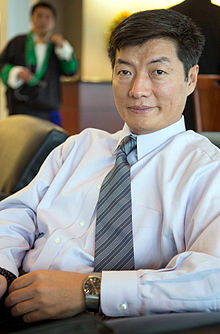Lobsang Sangay | |
|---|---|
| བློ་བཟང་སེང་གེ་ | |
 | |
| 1st Sikyong of the Central Tibetan Administration | |
| In office 20 September 2012 – 27 May 2021 | |
| Succeeded by | Penpa Tsering |
| 13th Kalon Tripa | |
| In office 8 August 2011 – 20 September 2012 | |
| Preceded by | Lobsang Tenzin |
| Succeeded by | Office abolished |
| Foreign Minister of the Tibetan Administration in Exile | |
| Assumed office 28 February 2016 | |
| Preceded by | Dicki Chhoyang |
| Personal details | |
| Born | 5 September 1968 Darjeeling, West Bengal, India |
| Citizenship | American |
| Political party | National Democratic Party of Tibet |
| Children | 1 |
| Education | University of Delhi (BA, LLB) Harvard University (LLM, SJD) |
| Lobsang Sangay | |||||||
| Tibetan name | |||||||
|---|---|---|---|---|---|---|---|
| Tibetan | བློ་བཟང་སེང་གེ་ | ||||||
| |||||||
| Chinese name | |||||||
| Chinese | 洛桑森格 | ||||||
| |||||||
Lobsang Sangay (Tibetan: བློ་བཟང་སེང་གེ་, lit. 'kind-hearted lion') is a Tibetan-American politician in exile who was Kalon Tripa of the Tibetan Administration in India from 2011 to 2012, and Sikyong of the Central Tibetan Administration in India from 2012 to 2021.
The Tibetan Administration was created in 1991 after the 14th Dalai Lama rejected calls for Tibetan independence.[1] The 14th Dalai Lama became permanent head of the Tibetan Administration and the executive functions for Tibetans-in-exile in 1991. In March 2011, at 71 years of age, the 14th Dalai Lama decided not to assume any political and administrative authority. The Charter of Tibetans in Exile was updated immediately in May 2011, and all articles related to political duties and regents of the 14th Dalai Lama were repealed.
Sangay was born in Darjeeling, India, and studied international law and democracy at Harvard University.[2] He holds American citizenship.[3]
- ^ "The Dalai Lama Has Been the Face of Buddhism for 60 Years. China Wants to Change That". Time. 7 March 2019. Retrieved 11 August 2023.
- ^ Dr Lobsang Sangay Archived 2019-03-17 at the Wayback Machine, National Press Club of Australia website
- ^ Raphael Ahren, In 1st Israel visit, a Tibetan leader quietly seeks support, hails Jews’ return, The Times of Israel, June 25, 2018: "Sangay, who spent many years in the US and holds American citizenship."